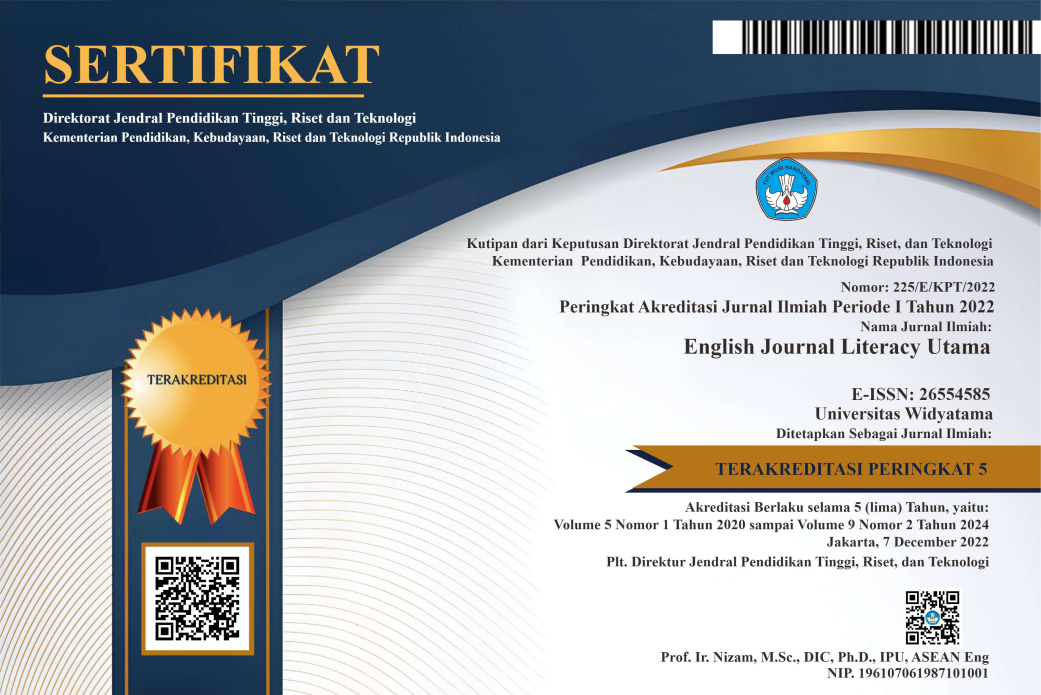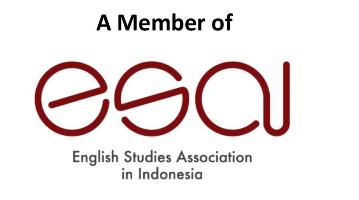FELICITY CONDITIONS IN SPEECH ACT FROM THE “KNIVES OUT” MOVIE: A PPRAGMATIC STUDY
DOI:
https://doi.org/10.33197/ejlutama.v8i1.227Keywords:
speech acts, felicity conditions, illocutionary actsAbstract
This study is entitled "Felicity Conditions in Speech Acts from the "KNIVES OUT" Movie: A Pragmatic Study". The research method used is descriptive qualitative because this research aims to classify, explain and summarize an utterance that appears in a film. The source of the data taken is the utterances that appear in the transcript of the film Knives Out in 2019. Based on the analysis that has been carried out, a total of 45 data types of speech acts have been obtained that consisting in directive action 24 data appear in the film consisting of ordering, commanding, questioning, and requesting forms of speech (53.4%); 8 assertive action data consisting of stating, affirming, asserting (20%); then in commissive action found 7 data consisting of suggest, promise, warn, confirm, offer, and intend (15.5%); and finally, 5 data were found with expressive actions (11.1%) consisting of greeting, condolence, apologies, and thanking; However, in this study, there were no declarations made during the film (0%). Apart from that, the data sources that have been analyzed based on speech acts have fulfilled the conditions of felicity, including the preparatory condition, which contains 19 data (42.3%), Essential Condition 15 data (33.3%), Sincerity Condition 10 (22 .2%), and Propositional Content Condition as much as 1 data (2.2%). From these two discussions, the utterances in the directive action dominate more than the other actions, and the preparatory condition dominates the feeling condition
References
Ambroise, B. (2010). From Speech Act Theory to Pragmatics. 1–11. https://halshs.archives-ouvertes.fr/halshs-00514810
Austin, J. (1962). Austin J. L. -How to Do Things With Words. In Oxford applied linguistics (pp. 1–174).
Barron, A. (2003). Acquisition in interlanguage pragmatics. In Pragmatics & Beyond: Vol. new ser. 1.
Cook, G. (1992). Language Teaching A Scheme For Teacher Education (C. N. Candlin & H. G. Widdowson (eds.)). Oxford University Press. http://gen.lib.rus.ec/book/index.php?md5=74ce4913fb648c915b27c6280efe09f7
Cruse. A. (2000). Meaning in language. Oxford University Press.
Haq, M. F. (2015). TINDAK TUTUR LANGSUNG PADA NASKAH FILM THE LION KING (1994) KARYA ROGER ALLERS DAN ROB MINKOFF: KAJIAN PRAGMATIS [Widyatama University]. http://localhost:8080/xmlui/handle/123456789/5905
Levinson, S. C. (1983). Stephen C. Levinson Pragmatics.
Mey, J. L. (2001). An Introduction of Pragmatics. Second Edition. In Blackwell Publishing (2nd ed.). Routledge. https://doi.org/10.4324/9780429451072-1
Michael, M. (1997). Concise Encyclopedia of Philosophy of Language. In P. V. Lamarque (Ed.), Australasian Journal of Philosophy (Vol. 79, Issue 3). https://doi.org/10.1080/713659258
Muhamad, A., & Simatupang, E. C. M. (2022). Felicity Condition of the Speech Act in Raya and the Last Dragon Movie: Pragmatics. … Critics Institute (BIRCI-Journal) …, 5(3), 18705–18711. https://doi.org/https://doi.org/10.33258/birci.v5i3.5861 18705
Searle, J. R. (1998). Mind, Language And Society Philosophy In The Real World Basic Books 1998. Basic Books.
Yule, G. (1996). Pragmatics (W. I. Fajar (ed.); III). Oxford University Press.
Yuliarti, I., Mujiyanto, J., & Saleh, M. (2021). The Fulfillment of Felicity Conditions in Speech Acts in Winfrey's Speech Learn from Every Mistake. English Education Journal, 11(4), 606–515. https://doi.org/10.15294/eej.v11i1.48795
Yunita, A., & Simatupang, E. C. (2022). Felicity Conditions of Speech Acts in Emma Watson's Social Media: Pragmatics Study. Budapest International Research and Critics Institute-Journal (BIRCI-Journal), 5(2), 6. https://doi.org/10.33258/birci.v5i2.5207
Downloads
Published
Issue
Section
License
Copyright (c) 2023 Dianita Dianita, Rivalda Achmad Sofyan

This work is licensed under a Creative Commons Attribution-NonCommercial-ShareAlike 4.0 International License.
Creative Commons Attribution-ShareAlike 4.0 International License















